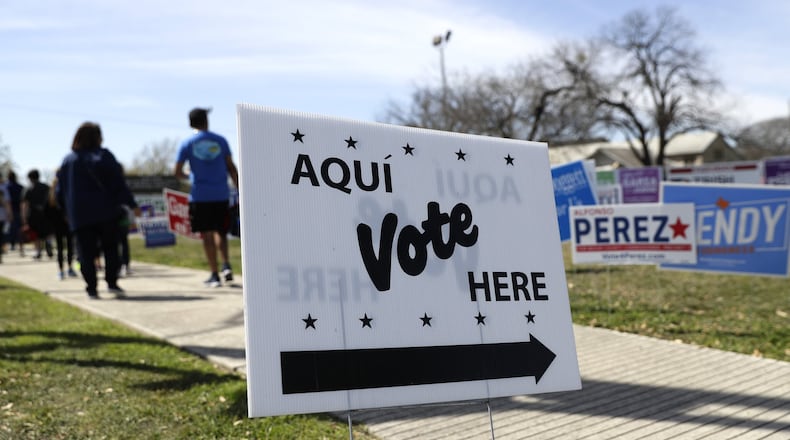The Democratic race for president has transformed since former Vice President Joe Biden’s dominating South Carolina victory, and it will be reshaped again Tuesday as voters in 14 states decide who should challenge President Donald Trump.
In the span of 24 hours, U.S. Sen. Amy Klobuchar and former Mayor Pete Buttigieg of South Bend, Ind., dropped out of the race and endorsed Biden as he tries to maximize his Saturday win. There are growing signs that centrists are rallying behind him to halt U.S. Sen. Bernie Sanders, a liberal rising in the polls.
The Vermont senator, who became the front-runner after early victories, is poised to pick up delegates Tuesday in California, New England and Texas. Biden is expected to expand on his popularity with black voters in the South. U.S. Sen. Elizabeth Warren is competing for a slice of the vote share in bigger states.
And former New York City Mayor Mike Bloomberg joins the field in earnest for the first time after skipping the four early contests. He’s drowned the airwaves with roughly $500 million in advertising and has built the biggest force of paid staffers of any Democratic hopeful.
Here’s a look at what to watch Tuesday:
The delegate race
The outcome of Super Tuesday’s vote might not make or break the top contenders, but it will set the course for the rest of the race. That’s because more than 1,300 delegates are up for grabs — roughly one-third of the total available.
Four years ago, the day was dubbed the “SEC primary” because it featured a collection of states mostly from the South. This year, the day features coast-to-coast contests that center on the two biggest prizes on the map: California and Texas.
Sanders has a wide lead in most polls in California, and a sweeping victory there would make it hard for any of his rivals to catch up in the all-important race for delegates. The state has 415 delegates up for grabs, and candidates must clear a 15% threshold to be eligible to nab any of them.
He’s also in a close race with Warren in her home state of Massachusetts, where the two-term senator probably has her best chance of a Super Tuesday victory. And Sanders has an edge in polling in Texas, where an exploding population and a surge of new voters has energized Democrats.
But the rest of the map is more fluid.
Klobuchar’s exit leaves her native Minnesota up for grabs. Biden hopes for blowout wins in Alabama, Arkansas, Tennessee and Virginia — all Southern states with large populations of black voters. And there’s limited polling in Colorado, where Latino voters could make up roughly 20% of the vote.
Biden’s moment?
The former vice president’s sweeping victory over the weekend in South Carolina did more than revive his campaign. It also forced two other moderate opponents out of the race and triggered a new wave of endorsements from prominent Democrats.
After restocking his campaign over the month of February, he’s hoping to cut Sanders’ margins in bigger states and crowd out Bloomberg among moderate voters. Support from both Buttigieg and Klobuchar could also help him consolidate centrists.
It’s been a dramatic reversal for Biden, who aced a pass-or-fail moment in South Carolina days ago when his cash-strapped campaign was scrounging for signs of encouragement after a winless streak in the first three early-voting states.
A Sanders rebound?
Not long ago, it seemed certain that Sanders would emerge from Super Tuesday with a delegate lead so daunting that other rivals couldn’t catch up. Now, as the party’s establishment forces rally behind alternatives, that’s not such a given.
Still, the map seems tailor-made for a big night for Sanders. He’s long held the advantage in California. But he’s also polling well in Texas, where Latinos make up a large proportion of voters, and North Carolina, where younger college-educated voters have flocked to his campaign.
But the surprise decision by both Buttigieg and Klobuchar could complicate Sanders' quest by narrowing the options for moderates. And Warren's pledge to stay in the race gives him a formidable opponent for liberal voters, albeit one with a string of disappointing finishes even after she wowed crowds at recent debates.
The Bloomberg effect
The billionaire’s debut in the primaries comes at a perilous moment for his campaign. Allies linked to former President Barack Obama have upped the pressure on him to exit the race. And shaky debates have unnerved even his most ardent supporters.
He’s staking everything on a strong showing in the Super Tuesday states, where he’s spent much of his time as other candidates canvassed early-voting contests. Though his polling numbers spiked earlier this year, most recent surveys show him trailing in the five biggest states to vote Tuesday.
Still, he’s promised to stay in the race if he falters — and he’s got the resources to back up his vow.
What it means for Georgia
By Wednesday morning, nearly 40% of the total haul of delegates up for grabs will be allotted to candidates. And that could mean Georgia is either instrumental in picking a nominee or irrelevant.
If a clear winner emerges — say, if Sanders stumbles or Biden busts — then Georgia’s March 24 primary could amount to a coronation. But the more likely scenario is that the state emerges as another key contest in a three-way fight or head-to-head matchup among the last candidates standing.
That will surely bring more attention and presidential visits to the state, which offers one of the larger troves of delegates and a deep base of fundraising support for whoever wins the nomination.
About the Author
Keep Reading
The Latest
Featured


